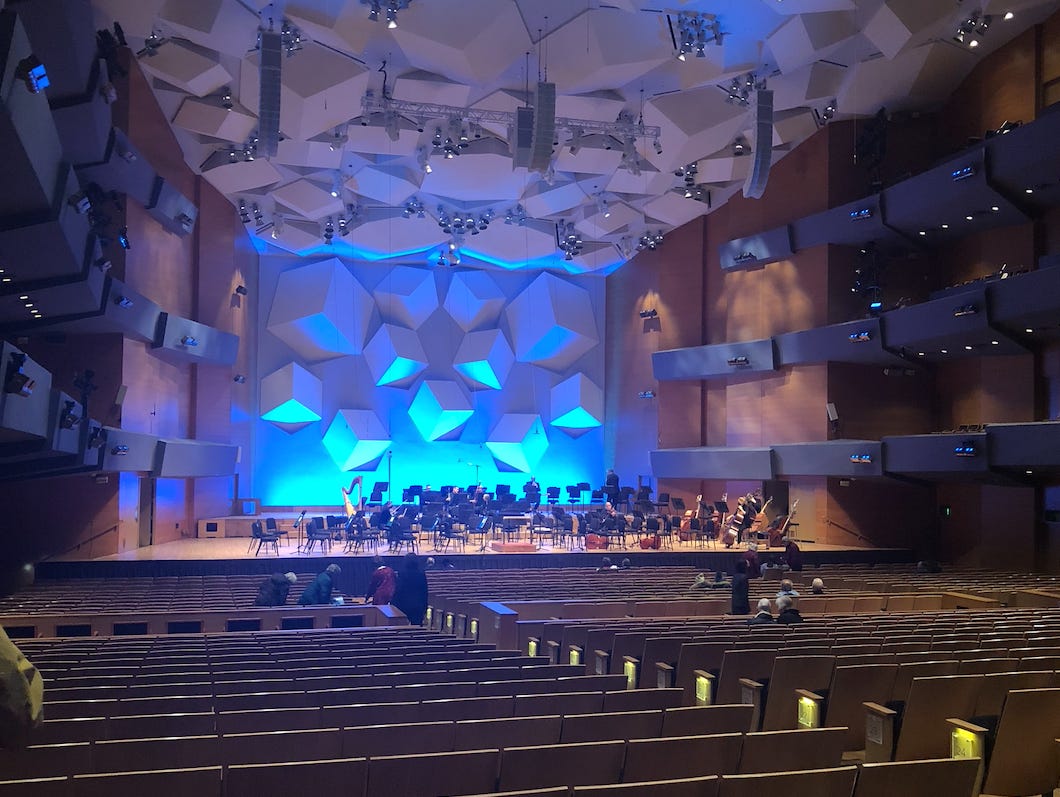This weekend, I went to see the Minnesota Orchestra play a piece by contemporary American composer Adolphus Hailstork, a cello concerto by Robert Schumann, and Mendelssohn’s Symphony No. 3, aka The Scottish Symphony. I like going to concerts and haven’t been in a long time. I’m not a special fan of any of these composers but wanted to see something this winter, and this program appealed more than, say, the upcoming four-night run of Harry Potter and the Half-Blood Prince™ In Concert.
In high school, I played clarinet in the orchestra. If you played a wind instrument, you had to make a special request to sign up, and then pass the teacher’s light interrogation about your motives (which were, of course, that you liked playing music but would rather die than do marching band). Do you like classical music? the teacher asked me in the music office. Yes, definitely, very much, I said. I was in eighth grade and obviously lying. I liked, like, Weezer. There’s no way he was convinced, but he let me in anyway. Why not?
Orchestra was chaos. Almost nobody actually practiced our instruments. Wind players had too much free time and were constantly flirting, passing notes, coming up with comedic bits to keep each other entertained. The percussionists invented a little piano tune, just a few bars, that managed to be so annoying that the teacher banned it from the classroom. We watched the movie Amadeus at least twice per year.
Each semester we were given a single writing assignment: to attend a concert and produce a one-page report about it. Most people opted to write about one of the occasional field trips we took to concerts locally or in Boston, though anything even vaguely classical was in bounds: piano recitals, Christmas choral performances, Harry Potter and the Half-Blood Prince™ In Concert, whatever. The first chair violin once lobbied hard to be allowed to write about a show by the alt-pop band Guster.
The assignment must have been designed to meet some school- or district-wide writing requirement, because the teacher clearly didn’t care about it. He didn’t instruct us on how to write these reports, or show us what a good one should look like. I don’t think he even graded them.
Some students must have turned in decent papers; mine were atrocious. Writing about music is a skill almost completely distinct from playing it. I could not begin to talk about how a piece of music worked or why it affected me. I liked Mozart, Stravinsky, piano works by Liszt, but what, specifically about them? No idea. My concert reports would be a couple tortured sentences about how “The tempo was fast” or “The second movement sounded melancholy,” and then a bunch of details about the decor in the theater, the mood in the audience, the conductor’s vibes, the soloist’s outfit.
Here’s my report from the Minnesota Orchestra this weekend: It’s fun to go to a place that’ll give you a youth discount for being under 40. A guy in the row ahead wore a broad-brimmed hat through the entire performance. The conductor seemed good-natured, but who ever really knows about these things. According to the program notes, Mendelssohn once called folk music “infamous, vulgar, out-of-tune trash.” The Schumann was not really my thing. The Hailstork blew me away and I couldn’t begin to tell you why.
“I just loved it, idk why” is terrible writing. The point of music is to express something that words alone cannot, but the point of writing about music is to grasp for the right words anyway. Language is always imperfect and incomplete, but we have to do our best with it anyway. That’s the whole set-up, it’s the bargain of being human.
Even so, sometimes it’s nice to find yourself in a situation where you are utterly lacking the tools to be a critic—where you have no words and simply have to experience the thing. What I’m trying to say is that I still can’t write a concert report, but somewhere along the way I started liking classical music for real. Thanks, Mr. Greene. Sorry I never practiced.





i love the scottish symphony!!!!!!!!!
I, too, have no idea how to write about music in any meaningful or critical way beyond "Sounds make brain feel good".
But I also miss classical music and big wind ensembles. The actual audio experience, yes, but also something about watching conductors and playing together with a group of like-minded teens with very little regard for what we were even playing.
(Our go-to band movie was Mr. Holland's Opus. Pretty sure we watched that at least once per year.)